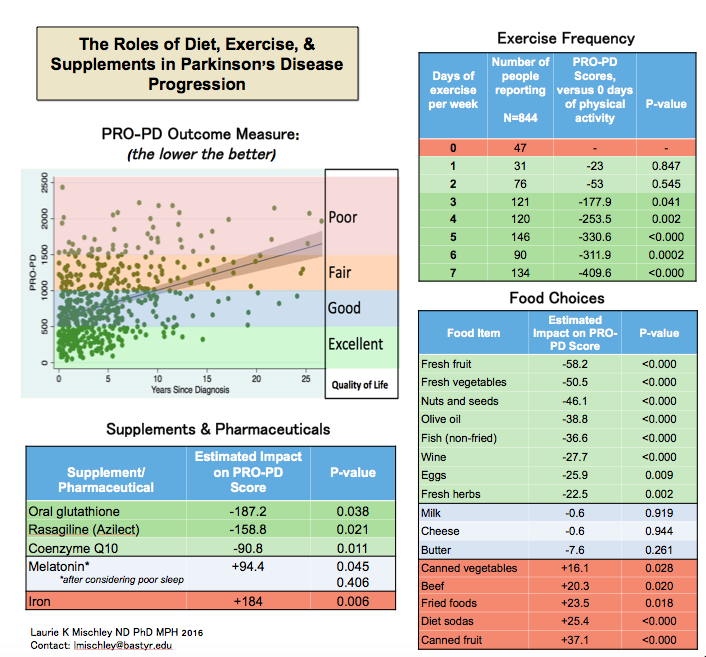Session Information
Date: Monday, June 5, 2017
Session Title: Epidemiology
Session Time: 1:45pm-3:15pm
Location: Exhibit Hall C
Objective: The goal of this ongoing study is to describe whether modifiable aspects of lifestyle are associated with PD symptom severity and progression.
Background: Epidemiological studies have show that consumption of green tea, coffee, blueberries and dairy avoidance result in reduced Parkinson’s disease (PD) incidence. That which prevents does not necessarily treat, and those already diagnosed want to know whether their lifestyle choices are associated with disease progression.
Methods: The goal of this ongoing natural history study is to identify modifiable lifestyle variables associated with rate of PD progression. The Patient-Reported Outcomes in PD (PRO-PD) is the primary outcome measure, ranging from 0 (asymptomatic) to 2500 (severe) to assess PD severity. Participants were asked to identify supplements they had taken consistently over the prior 6 months. Physical activity was defined as 30+ minutes. Food frequency questionnaires (FFQ) were used to quantify dietary intake. All analyses were adjusted for age, years since diagnosis, Hoehn & Yahr score, and gender.
Results: There was a dose-response curve with exercise, with seven days per week being the variable most strongly associated associated with lowest (best) PRO-PD score (p<0.000). Fresh fruit and vegetables, nuts and seeds, olive oil, non-fried fish, wine, eggs and fresh herbs were associated with improved outcomes (p < 0.005). Dairy consumption was not associated with PD progression. Canned fruit and diet soda were associated with worse outcomes over time (p < 0.000). Among nutritional supplements, oral glutathione and coenzyme Q10 were associated with improved outcomes (p=0.038 and p=0.011, respectively), while iron supplementation was associated with worse outcomes (p=0.006). Among PD pharmaceuticals, use of rasagiline was associated with improved outcomes (p=0.021).
Conclusions: The foods shown here to be associated with slower PD progression are common to the Mediterranean diet and support an existing body of literature. Glutathione and coenzyme Q10 deficiency have both been documented in PD; these data suggest oral supplementation may be a viable augmentation strategy in a naturalistic setting. This pragmatic natural history study offers the first evidence base for prescribing a Mediterranean diet, daily exercise, and targeted nutritional supplementation to patients with PD.
References: These data were previously presented in abstract form at World Parkinson’s Congress, Portland OR, 2016. (Updated dataset will be used for MDS 2017.)
To cite this abstract in AMA style:
L. Mischley, R. Lau. The Roles of Diet, Exercise, & Supplements in Parkinson’s Disease Progression [abstract]. Mov Disord. 2017; 32 (suppl 2). https://www.mdsabstracts.org/abstract/the-roles-of-diet-exercise-supplements-in-parkinsons-disease-progression/. Accessed December 16, 2025.« Back to 2017 International Congress
MDS Abstracts - https://www.mdsabstracts.org/abstract/the-roles-of-diet-exercise-supplements-in-parkinsons-disease-progression/

